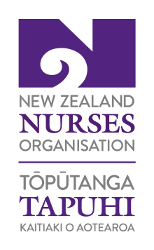
Media Release Strict Embargo midnight 27 February 2018
NZNO joins world Nursing Now! campaign
NZNO is embellishing its national ‘Visibility of Nursing’ campaign by joining the global movement Nursing Now. It seeks to further enable and empower nurses at the heart of worldwide efforts to tackle 21st century health challenges. The greater visibility of and access to nurses will increase access to healthcare globally.
The launch will be live streamed at (www.nursingnow.org/launch). #nursingnow.
Speaking at the launch event at St Thomas’ Hospital in London 27 February, the Duchess of Cambridge (a Nursing Now champion) will join the World Health Organisation’s (WHO) Chief Nursing Officer, the president of the International Council of Nurses (ICN), health leaders and nurses from around the world calling on governments, health professionals and service users to truly value nurses and champion their leadership in providing the best quality of care.
NZNO Kaiwhakahaere Kerri Nuku says she particularly wants to work towards joining the seams between nursing and midwifery so both can be raised up together where the professions overlap:
“We are working to develop the best nursing workforce ever seen in New Zealand and that means working across the specialist areas. Midwives working with nurses, nurses with doctors at all levels of healthcare both in the private and public sector.
“We recognise that midwives face the same pressures as nurses and that their extraordinarily valuable role needs to be strengthened and supported,” she said.
NZNO president Grant Brookes is also a champion of the global campaign:
“Nurses are the lynchpin of health teams, playing a crucial role in health promotion, disease prevention, treatment and care. The WHO estimates that nurses and midwives represent nearly half of all health workers around the world.
“It is estimated that to reach the UN global goal of health and wellbieng for all ages, around 9 million more nurses are needed worldwide by 2030 so nursing now and visibility of nursing projects are vital,” he said.
ICN will today release a report and set of resources for nurses: "Nurses: A Voice to Lead - Health is a Human Right." NZNO is releasing its Nursing Strategy 2018-2023 in Wellington on 22 March. To see the new ‘Everywhere in Health video clip visit the nzno website: www.nzno.org.nz
ENDs. Media contact: Karen Coltman 027 431 2617.
Information for reporters:
Nursing Now aims for 2020
Nursing Now will run to the end of 2020 – the 200th anniversary of Florence Nightingale’s birth and a year when nurses will be celebrated worldwide. We aim to improve perceptions of nurses, enhance their influence and maximise their contributions to ensuring that everyone everywhere has access to health and healthcare.
There are many organisations worldwide playing powerful roles in developing nursing and midwifery. Our aim is to complement and support them – bringing nursing to the forefront of thinking on global health and enabling nurses to do even more in improving health globally.
By the end of 2020, we want to see the following goals achieved:
1. Greater investment in improving education, professional development, standards, regulation and employment conditions for nurses.
- All countries have plans for developing nursing and midwifery;
- Increased investment in all aspects of nursing and midwifery; and
- More nurses in training and employment, with clear progress in eliminating the global shortfall of 9 million nurses and midwives by 2030.
2. Increased and improved dissemination of effective and innovative practice in nursing.
- Nursing organisations collectively support a coordinated global portal of effective practice and innovation used by nurses and policy makers around the world.
3. Greater influence for nurses and midwives on global and national health policy, as part of broader efforts to ensure health workforces are more involved in decision-making.
- All global and national policies on health and healthcare acknowledge the role of nursing in achieving their goals and include plans for the development of nursing; and
- All national plans for delivering UHC make specific proposals to enhance and develop the role of nurses as the health professionals closest to the community.
4. More nurses in leadership positions and more opportunities for development at all levels.
- At least 75% of countries have a Chief Nursing Officer or Chief Government Nurse as part of their most senior management team in health;
- More senior leadership programmes for nurses; and
- The establishment of a global nursing leadership network.
5. More evidence for policy and decision makers about: where nursing can have the greatest impact, what is stopping nurses from reaching their full potential and how to address these obstacles.
- A landmark study on the economic impact of nursing is published;
- More articles on nursing’s impact in peer-reviewed A* journals; and
- A coordinated global network on research on nursing is established.